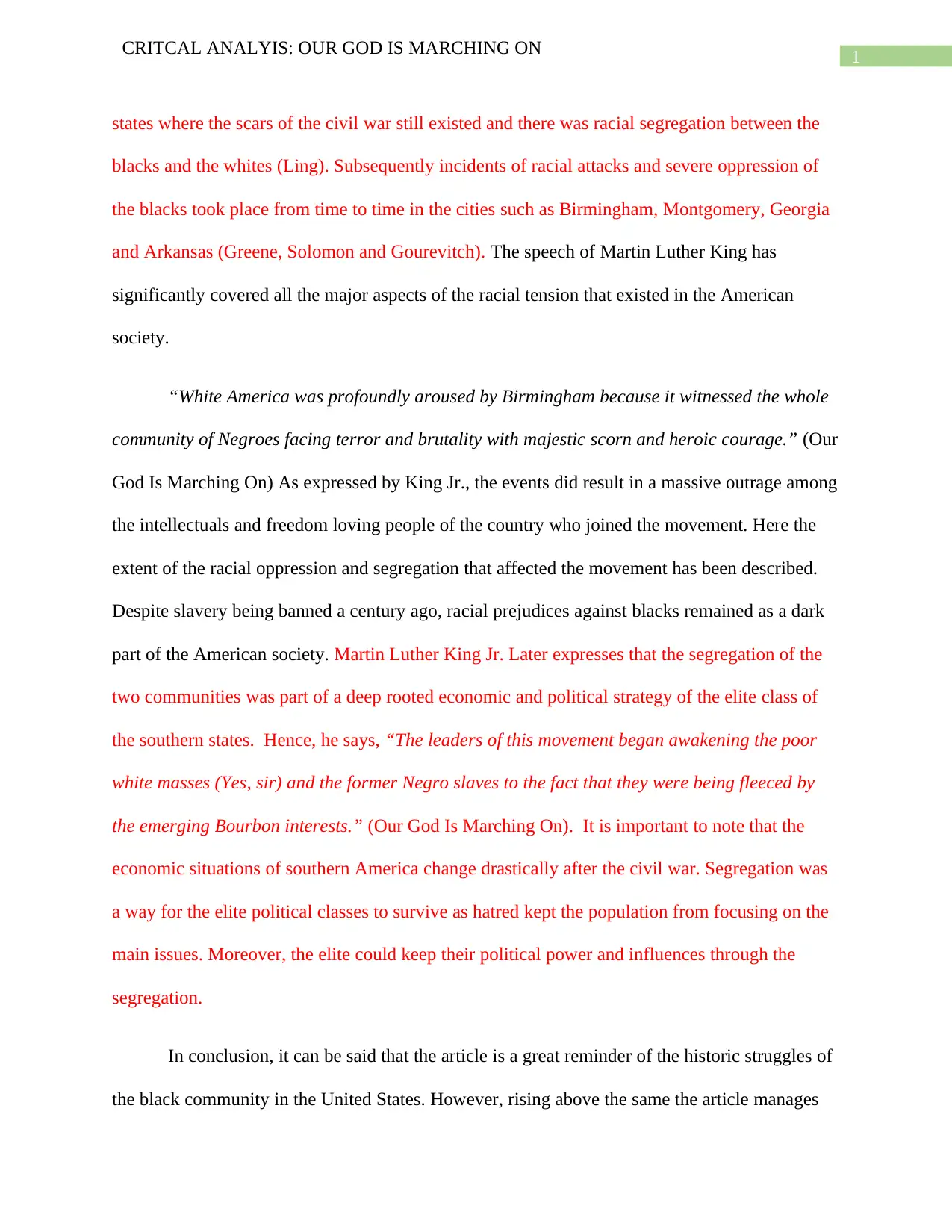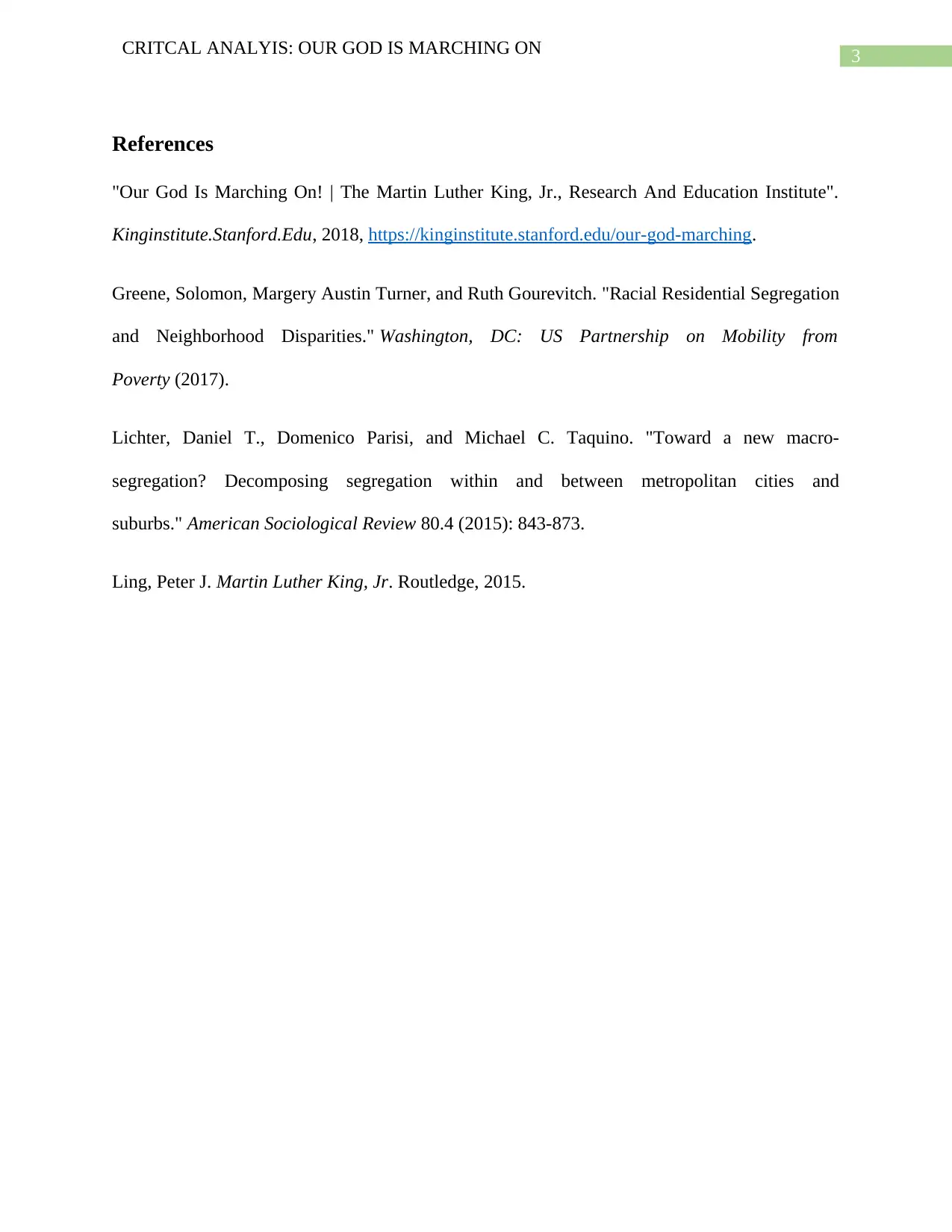ENG 101: A Critical Examination of Rhetoric in King's Speech
VerifiedAdded on 2023/06/04
|4
|828
|451
Essay
AI Summary
This essay presents a critical analysis of Martin Luther King Jr.'s speech, "Our God is Marching On," delivered after the Selma march. It examines the historical context of racial segregation and the struggles faced by Black Americans. The analysis highlights King's use of rhetoric to address the economic and political strategies underlying segregation in the Southern states. The essay argues that King's speech effectively captures the racial tensions and the growing outrage among intellectuals and freedom-loving people, ultimately emphasizing the importance of the anti-segregation movement. The essay concludes that the speech serves as a powerful reminder of the challenges faced by both Black and White Americans, fostering unity in the fight against segregation. Desklib provides similar essays and resources for students.

CRITCAL ANALYIS: OUR GOD IS MARCHING ON
Name of the Student:
Name of the University:
Author Note:
Our God is Marching On
This is a speech piece of Martin Luther King Jr. addressing a congregation at Alberta after
the great march from Selma, Alberta. The article contains the entire details of the speech
that addresses the issues related to racial segregations that were faced by Black Americans
at the time to a congregation. The speech is a vivid description of the circumstances that
were present at the time concerning the rights of the blacks. The article needs to be
analyzed to critical arguments that can highlight the significance of the subject considering
the present and historic oppression and subsequent struggles of the community (Lichter et
al.). The article provides great insight into the various aspects of the black struggle and the
various factors affecting the same.
As the opening paragraph of the speech says, “We have walked through desolate valleys
and across the trying hills. We have walked on meandering highways and rested our bodies on
rocky byways. Some of our faces are burned from the outpourings of the sweltering sun. Some
have literally slept in the mud.” (Our God Is Marching On), it somewhat points to the historic
struggles of the blacks in America along with the challenges faced by the people that have taken
part in the interview. One of the prime issue that has been covered through the article is
segregation in the American society. The beginning paragraphs of the article point towards the
problems faced by the blacks due to racial segregation. The problem was larger in the southern
Name of the Student:
Name of the University:
Author Note:
Our God is Marching On
This is a speech piece of Martin Luther King Jr. addressing a congregation at Alberta after
the great march from Selma, Alberta. The article contains the entire details of the speech
that addresses the issues related to racial segregations that were faced by Black Americans
at the time to a congregation. The speech is a vivid description of the circumstances that
were present at the time concerning the rights of the blacks. The article needs to be
analyzed to critical arguments that can highlight the significance of the subject considering
the present and historic oppression and subsequent struggles of the community (Lichter et
al.). The article provides great insight into the various aspects of the black struggle and the
various factors affecting the same.
As the opening paragraph of the speech says, “We have walked through desolate valleys
and across the trying hills. We have walked on meandering highways and rested our bodies on
rocky byways. Some of our faces are burned from the outpourings of the sweltering sun. Some
have literally slept in the mud.” (Our God Is Marching On), it somewhat points to the historic
struggles of the blacks in America along with the challenges faced by the people that have taken
part in the interview. One of the prime issue that has been covered through the article is
segregation in the American society. The beginning paragraphs of the article point towards the
problems faced by the blacks due to racial segregation. The problem was larger in the southern
Paraphrase This Document
Need a fresh take? Get an instant paraphrase of this document with our AI Paraphraser

1CRITCAL ANALYIS: OUR GOD IS MARCHING ON
states where the scars of the civil war still existed and there was racial segregation between the
blacks and the whites (Ling). Subsequently incidents of racial attacks and severe oppression of
the blacks took place from time to time in the cities such as Birmingham, Montgomery, Georgia
and Arkansas (Greene, Solomon and Gourevitch). The speech of Martin Luther King has
significantly covered all the major aspects of the racial tension that existed in the American
society.
“White America was profoundly aroused by Birmingham because it witnessed the whole
community of Negroes facing terror and brutality with majestic scorn and heroic courage.” (Our
God Is Marching On) As expressed by King Jr., the events did result in a massive outrage among
the intellectuals and freedom loving people of the country who joined the movement. Here the
extent of the racial oppression and segregation that affected the movement has been described.
Despite slavery being banned a century ago, racial prejudices against blacks remained as a dark
part of the American society. Martin Luther King Jr. Later expresses that the segregation of the
two communities was part of a deep rooted economic and political strategy of the elite class of
the southern states. Hence, he says, “The leaders of this movement began awakening the poor
white masses (Yes, sir) and the former Negro slaves to the fact that they were being fleeced by
the emerging Bourbon interests.” (Our God Is Marching On). It is important to note that the
economic situations of southern America change drastically after the civil war. Segregation was
a way for the elite political classes to survive as hatred kept the population from focusing on the
main issues. Moreover, the elite could keep their political power and influences through the
segregation.
In conclusion, it can be said that the article is a great reminder of the historic struggles of
the black community in the United States. However, rising above the same the article manages
states where the scars of the civil war still existed and there was racial segregation between the
blacks and the whites (Ling). Subsequently incidents of racial attacks and severe oppression of
the blacks took place from time to time in the cities such as Birmingham, Montgomery, Georgia
and Arkansas (Greene, Solomon and Gourevitch). The speech of Martin Luther King has
significantly covered all the major aspects of the racial tension that existed in the American
society.
“White America was profoundly aroused by Birmingham because it witnessed the whole
community of Negroes facing terror and brutality with majestic scorn and heroic courage.” (Our
God Is Marching On) As expressed by King Jr., the events did result in a massive outrage among
the intellectuals and freedom loving people of the country who joined the movement. Here the
extent of the racial oppression and segregation that affected the movement has been described.
Despite slavery being banned a century ago, racial prejudices against blacks remained as a dark
part of the American society. Martin Luther King Jr. Later expresses that the segregation of the
two communities was part of a deep rooted economic and political strategy of the elite class of
the southern states. Hence, he says, “The leaders of this movement began awakening the poor
white masses (Yes, sir) and the former Negro slaves to the fact that they were being fleeced by
the emerging Bourbon interests.” (Our God Is Marching On). It is important to note that the
economic situations of southern America change drastically after the civil war. Segregation was
a way for the elite political classes to survive as hatred kept the population from focusing on the
main issues. Moreover, the elite could keep their political power and influences through the
segregation.
In conclusion, it can be said that the article is a great reminder of the historic struggles of
the black community in the United States. However, rising above the same the article manages

2CRITCAL ANALYIS: OUR GOD IS MARCHING ON
the project the crisis that was faced by the black and white Americans alike that provided even
more strength to the anti-segregation movements.
the project the crisis that was faced by the black and white Americans alike that provided even
more strength to the anti-segregation movements.
⊘ This is a preview!⊘
Do you want full access?
Subscribe today to unlock all pages.

Trusted by 1+ million students worldwide

3CRITCAL ANALYIS: OUR GOD IS MARCHING ON
References
"Our God Is Marching On! | The Martin Luther King, Jr., Research And Education Institute".
Kinginstitute.Stanford.Edu, 2018, https://kinginstitute.stanford.edu/our-god-marching.
Greene, Solomon, Margery Austin Turner, and Ruth Gourevitch. "Racial Residential Segregation
and Neighborhood Disparities." Washington, DC: US Partnership on Mobility from
Poverty (2017).
Lichter, Daniel T., Domenico Parisi, and Michael C. Taquino. "Toward a new macro-
segregation? Decomposing segregation within and between metropolitan cities and
suburbs." American Sociological Review 80.4 (2015): 843-873.
Ling, Peter J. Martin Luther King, Jr. Routledge, 2015.
References
"Our God Is Marching On! | The Martin Luther King, Jr., Research And Education Institute".
Kinginstitute.Stanford.Edu, 2018, https://kinginstitute.stanford.edu/our-god-marching.
Greene, Solomon, Margery Austin Turner, and Ruth Gourevitch. "Racial Residential Segregation
and Neighborhood Disparities." Washington, DC: US Partnership on Mobility from
Poverty (2017).
Lichter, Daniel T., Domenico Parisi, and Michael C. Taquino. "Toward a new macro-
segregation? Decomposing segregation within and between metropolitan cities and
suburbs." American Sociological Review 80.4 (2015): 843-873.
Ling, Peter J. Martin Luther King, Jr. Routledge, 2015.
1 out of 4
Related Documents
Your All-in-One AI-Powered Toolkit for Academic Success.
+13062052269
info@desklib.com
Available 24*7 on WhatsApp / Email
![[object Object]](/_next/static/media/star-bottom.7253800d.svg)
Unlock your academic potential
Copyright © 2020–2026 A2Z Services. All Rights Reserved. Developed and managed by ZUCOL.





